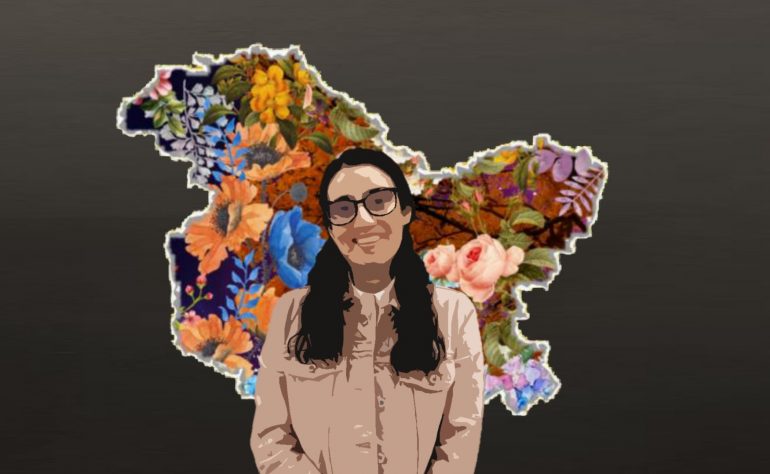A few weeks ago, Kashmiri scholar, Misbah Reshi, was awarded the Rhodes Scholarship for the academic year 2021-22. Misbah is the first Kashmiri woman to be awarded this scholarship. The Rhodes Scholarship is the “oldest (first awarded in 1902) and perhaps most prestigious international scholarship programme, enabling outstanding young people from around the world to study at the University of Oxford.”
Misbah has tirelessly worked to get to where she is. As an early career research and a law student, she has contributed meaningfully towards Kashmir through her commitment towards human rights. In our conversation Misbah reflected on her journey- locating her struggles, privileges and challenges in shaping her academic interests.
She says, “I am an embodiment of where I come from, my experiences, and my immediate surroundings. I have been very fortunate to have had a journey where my experiences have taught me immensely and propelled me to do the work that I have done. Through the work I chose to do, I met some extremely wonderful people who have helped me get to where I am. I grew up in Delhi so I had certain privileges vis a vis my family back home in Kashmir. Being aware of those privileges and always being disturbed by the distinct realities – my feelings sublimed into my investment in human rights law. I aim to continue my work in this field and hope to contribute to bringing valuable change. “
She is a final year law student at Campus Law Centre, Faculty of Law, University of Delhi. Misbah also completed her undergraduate degree from Delhi University, studying philosophy at St. Stephen’s College. During this time she was associated with organisations such as Jammu Kashmir Coalition of Civil Society (JKCCS) and Citizen’s Against Hate (CAH). She was a contributor to the JKCCS’s 2020 report titled, “Kashmir’s Internet Siege” where examined the consequences of the digital siege in Jammu and Kashmir. Similarly, her work at CAH culminated into a report on the victims of pellet guns and its impact in Kashmir.
Addressing Kashmiri students (particularly women) who see goals such as these as unimaginable, Misbah notes, “The first step would be demystifying the end goal. The Rhodes Scholarship is definitely one of the most competitive scholarships- simply for the opportunities that come your way through it but it is not unattainable. The Scholarship looks for ‘young people of outstanding intellect, character, leadership, and commitment to service’ and these are adjudged as four separate and distinct characteristics that each applicant must possess. My advice for young Kashmiri women, who are looking to apply to the scholarship would be to ensure that they showcase these characteristics in whatever work they take on and reflect it in their application. The Rhodes Scholarship is a merit-based scholarship that values academics a lot, hence it is absolutely necessary that applicants score well, engage in classroom discussions, and think critically within their area of academic interest. Apart from that, it is important to take part in extracurricular activities and do work which makes meaningful and valuable contribution to society.”
Speaking about the factors driving her research interests as a student of law and discussing the prospects for young Kashmiri women taking up serious academic and scholarly research she said “Laws can be both oppressive and emancipatory- it depends on how we view it and how we use it. Growing up as a Kashmiri Muslim girl- certain problems weren’t just visible but also part of my lived reality. This positionality not only helped me understand systemic and structural problems but also allowed me to understand the struggles of others and extend solidarities. I was eager to study law – for my interest in the subject and my opinion of it being a valuable tool for social change. At the intersection of my identity, interest, and opinion- I decided to pursue a career in law so I could better understand the socio-political problems embedded in legality and work towards solving them through different legal mechanisms. In legal academia, there is a very little work done by Kashmiris- specifically women and it is imperative that we fill this void. I believe there is a lot of scope in radically imagining law, writing on it, and using it for social change – if Kashmiri women do invest in such research it will provide the much needed insight on our imagination of laws and redressal mechanisms. Legal scholarship does not exist in a vacuum and is aided and supported by different disciplines so while I have chosen to pursue a career in law, one can choose whatever subject they are interested in. The larger point is to use research and writings to compel people to be more critical and think beyond their biases…
…Even in litigation there are very few Kashmiri women- both in lower and higher courts of the country. In J&K High Court itself, there are very few female Senior Advocates. I think for those who do not wish to immerse completely in academia but want to still pursue higher education- can apply for the scholarship, study, write and then move to litigation – where they can practically implement some of their writings.”
Misbah will be applying to read the Bachelor of Civil Laws, a post-graduation law course at Oxford. Being the first woman from the valley to receive this prestigious scholarship is a monumental feat in itself which deserves recognition and accolades. At ZW, we take immense pride in knowing that Misbah is going places as a vocal feminist and an advocate for the rights of Kashmiri people.

